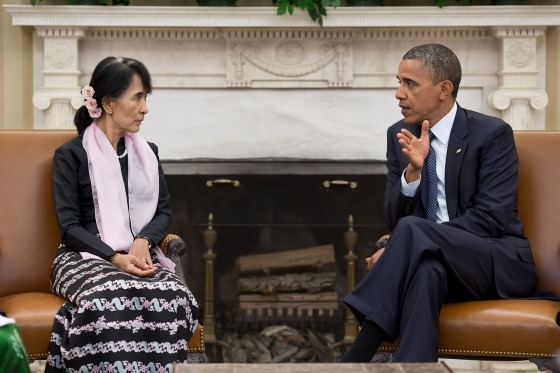
Official White House Photo by Pete Souza
We frequently talk about purpose in the context of individuals or organizations, but there are other areas where identification and understanding of purpose is critical. One such instance is in the context of leadership, and Isadore Sharp, founder and Chairman of the iconic Four Seasons Hotel brand provides a great example.
Sharp finished college with an architecture degree and joined his father’s construction business in the Toronto area. After building several motor hotels, he recognized that his passion lay not in constructing and owning hotel buildings, but in providing a premier guest experience and level of customer service. He wanted to “welcome customers and treat them like guests coming into our home.” So Sharp shifted from being a hotel owner-operator into managing hotel properties. His priority is a commitment to the Golden Rule, where employees and guests alike are treated with respect. Along the way he had to examine the behavior of his senior leadership team and part company with those who couldn’t lead by example. As a result, with 96 properties in 41 countries and annual revenues in excess of $4B, both customer and employee retention is high, and they’ve been on the list of 100 Best Places to Work for 18 consecutive years.
Sharp understands that his leadership purpose was to provide a premier level of hospitality and service. And over time, he recognized the importance of building the right team around him, whose perfomance aligned with that purpose. He fulfills his purpose based on leadership strengths of treating guests with respect and sincerity, and providing the right location and environment for a first class stay. He consistently embeds it into every aspect of his organization’s processes, rewards and behaviors; and believes that a true leader influences not from a position of power, but from a position of respect. His leadership purpose and strengths, then work together to accomplish his leadership goal of generating a reasonable profit that benefits the company, hotel owners, customers and employees.
Leadership purpose forms the “why” of your leadership. Are you seeking a leadership role simply because of the power, position, people or profits? Or are you leading because of the purpose, mission and vision that you are pursuing, no matter the size of the role? Leadership strengths are the capabilities and critical success factors necessary to operate in your purpose. And leadership goals are the results you accomplish in your work.
Great Leaders Have Great Leadership Purpose
Leaders are most successful when they lead based on a deep sense of purpose. This passion provides a level of inner drive that enables them to envision more, attempt more, and achieve more. Fortune’s 2016 list of The World’s 50 Greatest Leaders has a sterling list of individuals who lead based on their purpose. Here are a few examples.
Stephen Curry, Point Guard for the Golden State Warriors. Curry is described as arrogant on the court and humble off the court. “I know why I play the game, and it’s not to score 30 points a night, but it’s to use the stage I’m on. I’ve been put here for a specific purpose: to be a witness and to share my testimony as I go through it.” (4) Curry’s leadership purpose is sharing his testimony, which he does based on his leadership strength of playing basketball, to accomplish his leadership goal of winning.
Bono, Lead Singer U2 and Co-Founder One. Most people know and respect him as a music legend. But Bono’s real legacy is his leadership purpose of leveraging his stardom to convince others to be leaders of change. He does this by utilizing his leadership strength of raising money through his One campaign to improve the conditions of people in impoverished nations; to accomplish the leadership goal of eliminating debt, providing health care and electricity among other initiatives.
Aung San Suu Kyi – Leader of the National League for Democracy in Myanmar has committed her entire life to her leadership purpose of fighting for democracy in her country. Her father was one of the heroes who formed the country after World War II, and she was placed under house arrest for almost 20 years because of her stand. Suu Kyi demonstrated her leadership strength in her readiness to suffer in any way necessary to gain democracy. Over time global support for her cause prevailed, and she accomplished one of her leadership goals when the country’s regime held free elections in 2015.
From Purpose to Strengths to Goals
In each case, these individuals have led with purpose, leveraging their strengths to achieve a goal. When you learn their stories, you realize that they didn’t choose their own leadership purpose. Their leadership purpose chose them, through a confluence of life experiences, natural inclinations, and innate forces that gave meaning to their daily existence. Their leadership strengths were identified based on their capabilities. And their leadership goals were reflected in their results.
Each of us have the potential to be a great leader, once we answer the key questions of:
- Why do you want to lead? – Your mission and vision.
- How will you get it done? – Your capabilities.
- What do you want to accomplish? – Your results.
But you don’t have to be famous to be a great leader. You only have to discover your leadership purpose and work to fulfill it. You only have to impact the people and situations assigned to you, in your sphere of influence. You only have to be the best YOU.





Add Comment